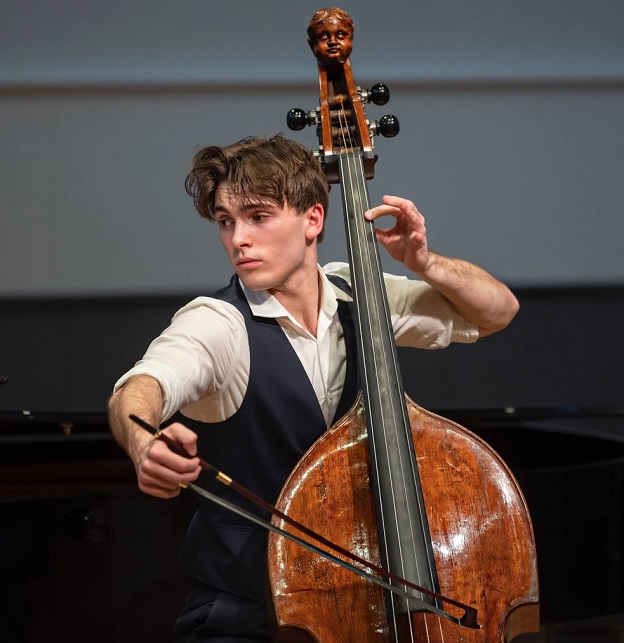Last January, the jury of the International Classical Music Awards (ICMA) announced the launch of a Classeek Award to promote an outstanding young musician among the finalists of the Classeek Ambassador Program, a platform for emerging artists whose main initiative is an annual program to discover, support and promote promising young classical musicians. Marc-André Teruel, a French-Austrian double bass player, is the first recipient of this new ICMA award. He will receive his trophy at the ICMA awards ceremony in Wroclaw, Poland, on April 21. Charlotte Saulneron of ResMusica, a member of the jury, interviewed the musician.
When people talk about your work, they often talk about your ability to « push new limits ». Do you agree with this approach? And if so, can you explain to us the limits you push?
The double bass in the world of classical music is subject to many clichés: too low to be a soloist, obliged to accompany, lack of repertoire. Historically, this instrument has always had an accompanying role. When people talk about my work and talk about « pushing certain limits », I’m very touched because it makes things move forward: the perception of the double bass changes.
The biggest problem of the double bass is its low range, which prevents it from being perceived as a solo instrument. A particularity of my playing is the fact that I use a different tuning (as in the baroque era): My instrument is tuned higher, which transforms it from a bass register to a bass-baritone register.
How does one become a double bass player? Does it reflect any of your personality traits?
That’s a pretty interesting question I often ask myself, with a rather atypical answer. Born in a family of musicians, I started playing the violin at the age of 4. Very quickly I noticed that it was not what I needed. I needed a bigger, deeper instrument, I was often told that I had too much strength. It was at the age of 5 that I came across the cello, an instrument that I already liked much more. It was only at the age of 10 that I was no longer satisfied with the size of the cello and decided to go even further: the double bass.
I think that being a double bass player probably reflects some of my personality traits. In everyday life, a double bass player is constantly confronted with the physical limitations of the human body. Just carrying this instrument often requires thinking outside the box in order to get to its destination, and this instrument is so large and difficult to play that it requires a great deal of physical strength. I am a person who always needs to project myself beyond my own limits (for example in sports). What fascinates me in life is to always go further and find the next challenge.
Which work represents you most as an instrumentalist, and why?
I think I speak for many artists when I say that it is impossible to limit yourself to one piece. What makes the world beautiful is diversity, and for me it’s the same in music. Being able to play through the different eras of music history is something that energizes me day after day. However, Romanticism is a period that has always attracted me the most and that fits me well.
And what work would you like to work towards, either in terms of playing or interpretation? Or from another point of view for that matter!
There are so many different works that I want to play. I always say that I am a musician before I am a bass player: what attracts me is beautiful music, and I only see my instrument as a tool to access that music. One of the next works I will be working on is Robert Schumann’s Dichterliebe cycle op. 48.
If you were to dream of an ideal musical evening as a performer, what kind of program would you put together and which musicians and orchestras would you invite to join you on stage?
An ideal musical evening can be very different from each other. What is important to me is to perform the divine music of a first class composer with musicians who share my love of music. For me, first class composers are Bach, Beethoven, Brahms, Schumann etc. My dream would be to play as a soloist with the Vienna Philharmonic.
Your youth leads you to demystify a repertoire anchored in a rather conservative universe thanks to a relationship with social networks which remains to be developed in the classical music world. Is this a constructed or instinctive process for you?
Like all aspects of my life, instinct dominates. My approach to social networking is very instinctive and I think it’s also pretty important to be able to stay authentic to yourself and of course the world.
You have already won many prizes (Rhan Musikpreis competition, Anton Bruckner First Prize of the Vienna Symphony Orchestra, prize at the Karl Ditters von Dittersdorf competition, etc.). What do you think winning this ICMA Classeek award will do for you?
It is a great honor for me to have the chance to be the recipient of such an award. Having such a great mission, it is important to have support. This award is a wonderful opportunity to reach a more diverse audience and surprise the world with the double bass, but most of all, it is a sign of confidence not only in myself but also in my mission: to bring the solo double bass to the general public in the same way they know the violin or the piano.
And finally, now that we know you a little better, Marc-Andre Teruel, can you introduce us to your double bass?
Over the years I’ve had the great opportunity to play on different old instruments, which has taught me a lot. Each instrument has a different soul, and like a person, different character traits. I can’t play the same way on every instrument. One could say that each instrument must first teach me how to play it in order to be able to acquire the ability to bring out all the different colors. At the moment I have the chance to play on a Viennese double bass from 1827 built by Martin Stoß. For me, this double bass has a very strong character, very extroverted, but it is rather stubborn and does not let itself be done. A bit like me!




















